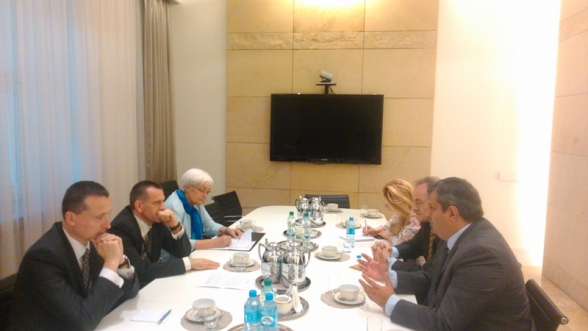Day two of the official visit to the Polish Sejm was marked by meetings of the Chairperson of the Committee on European Integration Mr Slaven Radunović with the chairpersons of European Union affairs committees of both Sejm and the Senate, members of the Local Self-Government and Regional Policy Committee, as well as with director of Directorate for European Affairs and Enlargement at the Ministry of Foreign Affairs of the Republic of Poland.
On behalf of the European Union Affairs Committee of Sejm, while describing the political situation in Poland, Chairperson of the Committee Ms Agnieszka Pomaska and Deputy Chairperson Mr Andrzej Galažewski pointed out differing opinions with regard to the vision of the European Union and the position of Poland within it. In that sense, there are those who believe that the European Union should be more effective and more present on the international stage, and the position of Poland should be such to more significantly influence the overall European policy. On the other hand, there are those who share the Cameron approach, in the sense that the European Union should be regarded as a free union of states with emphasised position of the national states. However, they pointed out the existence of the absolute parliamentary consensus regarding further EU enlargement, and on that occasion they emphasised the support to Montenegro regarding its EU membership, under the condition of fully meeting all the requirements of the European Commission. The Chairperson of the Committee Ms Pomaska drew a parallel with regard to the work of the Committee in the pre-accession period and today, and emphasised that the work of the Committee had intensified ever since Poland became the EU member, because the focus of its work had become a wide spectrum of issues that should be considered, but also the commitments that should be harmonised, not only at the national level, but also with the European Parliament calendar. In that regard, she pointed out the significance of cooperation with other working bodies, but also with representatives of groups for cooperation such as Visegrád Four and the Weimar Triangle, as well as a group of the Baltic countries.
Chairperson of the Committee on European Integration of the Parliament of Montenegro Mr Slaven Radunović pointed out the complexity of the accession process and the requirements that Montenegro and its administration were facing, an administration far smaller than the Polish one, but distinguished by exceptional commitment and dedication in honouring deadlines and fulfilling requirements. On the other hand, he pointed out the necessity of existence of strong political will in order to overcome the greatest challenges in Montenegro concerning the introduction of the rule of law and other issues envisaged by Chapters 23 and 24, the resolution of which could contribute to reforms of the overall society. Pointing out the existence of the absolute parliamentary consensus regarding Montenegro’s accession to the EU, Mr Radunović added that the task of the political elite was to bring the European processes closer to the citizens and thus provide a greater support for membership.
At the meeting with members of the Local Self-Government and Regional Policy Committee, the Chairperson at the meeting Ms Halina Rozpondek pointed out the structure of the Committee, dealing with consideration of proposals for laws for self-government, using of the EU funds, and regional policy. During the meeting they pointed out the significance of coordination and cooperation of state and local authorities, while they especially emphasised the significance of direct connection between the Parliament and municipalities, and they also noted the funding of municipalities, and the projects mostly implemented using EU funds.
Chairperson of the Committee Mr Radunović said that the resources from the IPA funds were exceptionally significant for Montenegro, both for reforms in society and development of its municipalities. He asked the hosts how Poland resolved the human resources issues with regard to the very writing of projects for the EU funds. On that occasion, it was pointed out that Poland had been facing the lack of professional capacities as well, but that the very trainings were funded by resources allocated through the said funds.
The meeting with members of the European Union Affairs Committee of the Senate was marked by discussion on significance of harmonisation of laws with the European acquis in accordance with the interests of the citizens, to which those regulations refer, and who in the end implement them. The focus of the meeting was support of the citizens to the integration process, and the Chairperson of the Committee Mr Edmund Wittbrodt said that the support in Poland had varied in the accession process, while the most sceptical in that regard had been the agriculturists. However, as he said, today, ten years after Poland’s accession to the EU, the support for the EU was at almost 90%. Chairperson Radunović pointed out the value for Montenegro of sharing the Polish experience, as someone known as the best European success story regarding the progress after joining the Union.
The meeting with Mr Arthur Ozernovskiy, director of Directorate for European Affairs and Enlargement at the Ministry of Foreign Affairs, was marked by discussion on dynamics of negotiations and key challenges of Montenegro on its path towards the EU. On that occasion it was pointed out that Montenegro was a candidate country with most opened chapters, but that the most demanding stage of the accession was before it, entailing the securing of implementation of the already established normative framework, and the efforts regarding achieving measurable results in the field of judiciary, tackling corruption and organised crime, and all in order for the citizens to feel the benefits of the overall European integration process.









